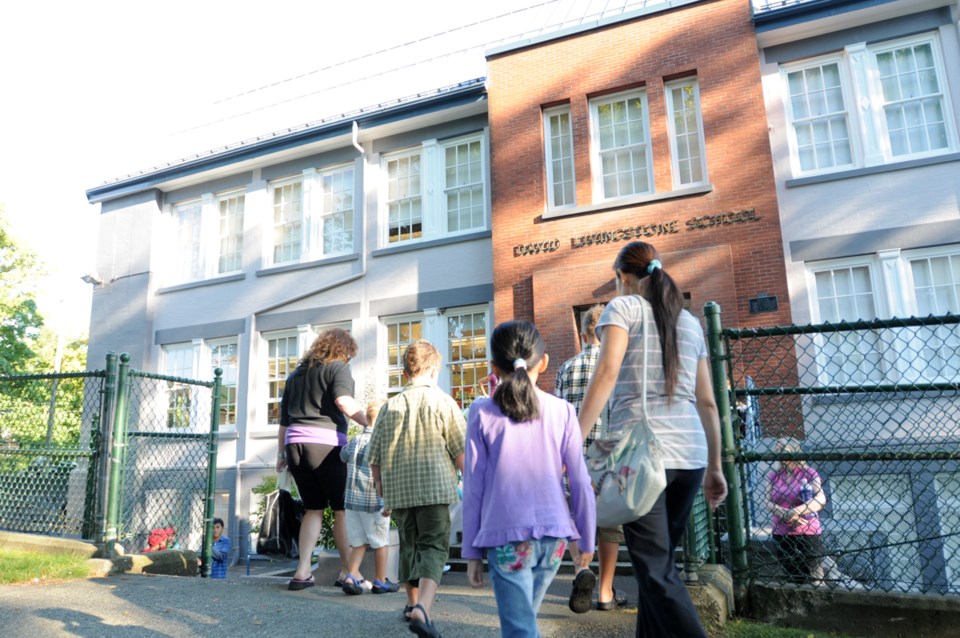Although education funding is going up in B.C.’s new budget, there’s not a lot extra in it, beyond covering the requirements of the teachers’ contract and rising enrolment. But other measures — like affordable childcare and housing — should help the province attract and retain new teachers.
The $238-million rise in education funding in the balanced budget is eclipsed by the $1 billion invested in childcare, which Finance Minister Carole James said is the first step in a universal child care program.
Investing in children means investing in our future, James said.
“Our children deserve the best education from dedicated teachers and teaching assistants throughout the province,” James said in her budget speech. “These are the professionals who help shape the young minds of tomorrow. They get kids excited about science, athletics and literacy and teach them how to be good global citizens.”
BCTF president Glen Hansman applauded the childcare and housing initiatives, saying they will benefit many of B.C.’s teachers.
Big #BCbudget news is the historic investment in a universal childcare program. Thousands of new and young teachers will benefit. Combined with housing announcements, this focus on affordability will help address #bced’s ongoing teacher shortage.
— BCTF (@bctf) February 20, 2018
The government has added an extra $24 million a year to the education budget to boost the $376 million that was already added in September, to cover the costs of hiring 3,700 new teachers. Enrolment is also expected to increase in the province, bringing the total education budget — the second largest in the province after health — to nearly $6.4 billion by 2020-21, up from today’s $6.1 billion.
Teachers won a landmark Supreme Court of Canada case in 2016, restoring contract terms that were stripped in 2002 that cover class size, class composition and specialist teachers. That court win has caused a province-wide teacher hiring spree, as well as a shortage of teachers.
“B.C. has several thousand young teachers who were hired following our Supreme Court of Canada win,” Hansman said. “This budget’s overall focus on affordability will help recruit qualified teachers from other provinces to B.C. to help address our province’s ongoing teacher shortage.”
Parent Jen Mezie, who is president of the B.C. Confederation of Parent Advisory Councils, said parents are very happy to see the investment in early childhood education and childcare. In particular, they think it could bring about a “dramatic change” for vulnerable learners, who will be able to be assessed and get services earlier than they would if they waited until entering the K to 12 system. She said parents are also happy to see funding for playgrounds, because it will take pressure off of parent fundraising.
The investment and commitment to universal access to childcare and inclusive early learning is a positive indication that improved inter-ministerial cooperation could support the needs of children of all ages, especially those who require extra support #2018Budget pic.twitter.com/xq6zgkenfm
— BCCPAC (@BCCPAC) February 20, 2018
Hansman said he is concerned that the budget doesn’t explicitly include any new operational money for schools, which he said are still fettered by years of funding cuts and administrative savings implemented by the previous Liberal government.
He’s particularly concerned about new money to implement the new curriculum, both for equipment and for teacher training.
The NDP has launched a funding formula review and said in its election platform that “a per-pupil funding model doesn’t work for our diverse education system in B.C.” That review is in the information-gathering phase, with results expected by this summer, to be implemented for the 2019-2020 school year.
On the capital side, over the next three years, $2 billion will be spent on maintaining or replacing schools.
One wrinkle introduced in the new budget will see some savings for school boards evaporate.
This year, the Vancouver School Board projected a $1.1-million savings in the first six months of this year in the cost of benefits, due to the Medical Services Plan premiums being cut in half on Jan. 1, 2018. For a full year, that would likely have been about $2.2 million.
However, to replace lost revenue from MSP premiums, the new budget brings in an employer health tax of 1.95 per cent of payroll each year. Smaller employers will pay a reduced or nil tax rate. Public entities like the VSB, however, now they will be expected to cough up the new tax.
As far as childcare goes, the new funding contains both a fee reduction plan and increased subsidies for low-income families. It also includes 22,000 new spaces, some of which could be built in schools. The budget introduces a new speculation tax, an increase to the foreign buyers’ tax and many other measures designed to moderate the housing market.
The NDP’s first full budget is nothing if not ambitious. It may not be as rich as some would have hoped for schools, but the significant investment in childcare should go a long way towards helping the most vulnerable students.
Tracy Sherlock writes about education and social issues. She can be reached at tracy.sherlock@gmail.com



